Improving
adult skills
West Yorkshire Adult
Education Budget
2021-2022
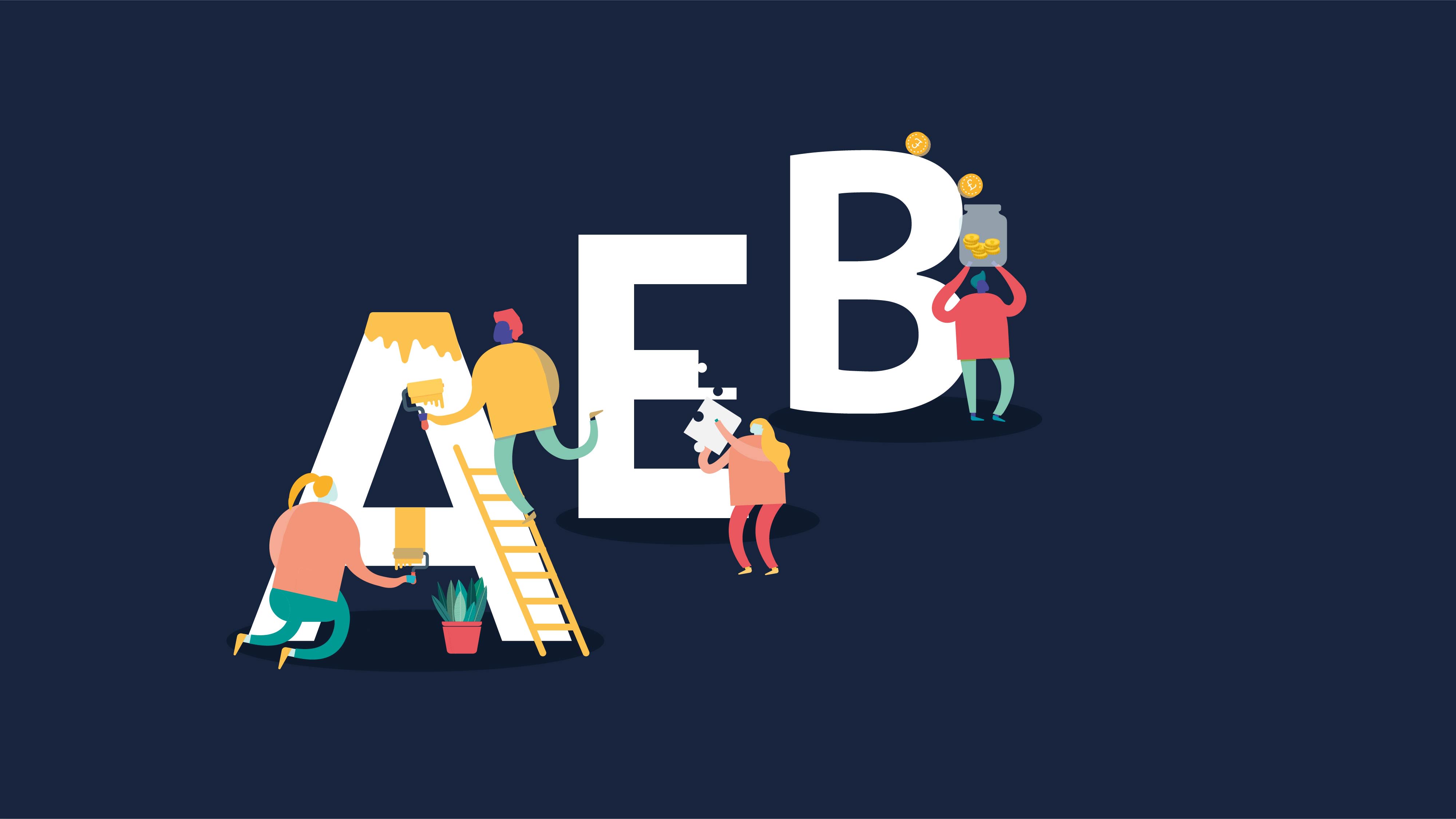
West Yorkshire Combined Authority
West Yorkshire is made up of the five Local Authorities of Bradford, Calderdale, Kirklees, Leeds and Wakefield. We are a £58 billion economy at the heart of the North, home to a population of 2.3 million, with a workforce of 1.2 million and 95,000 businesses. Led by Tracy Brabin, Mayor of West Yorkshire, the West Yorkshire Combined Authority is working together with partners across the region to grow an inclusive economy, promote equality, diversity and inclusion and tackle the climate emergency.
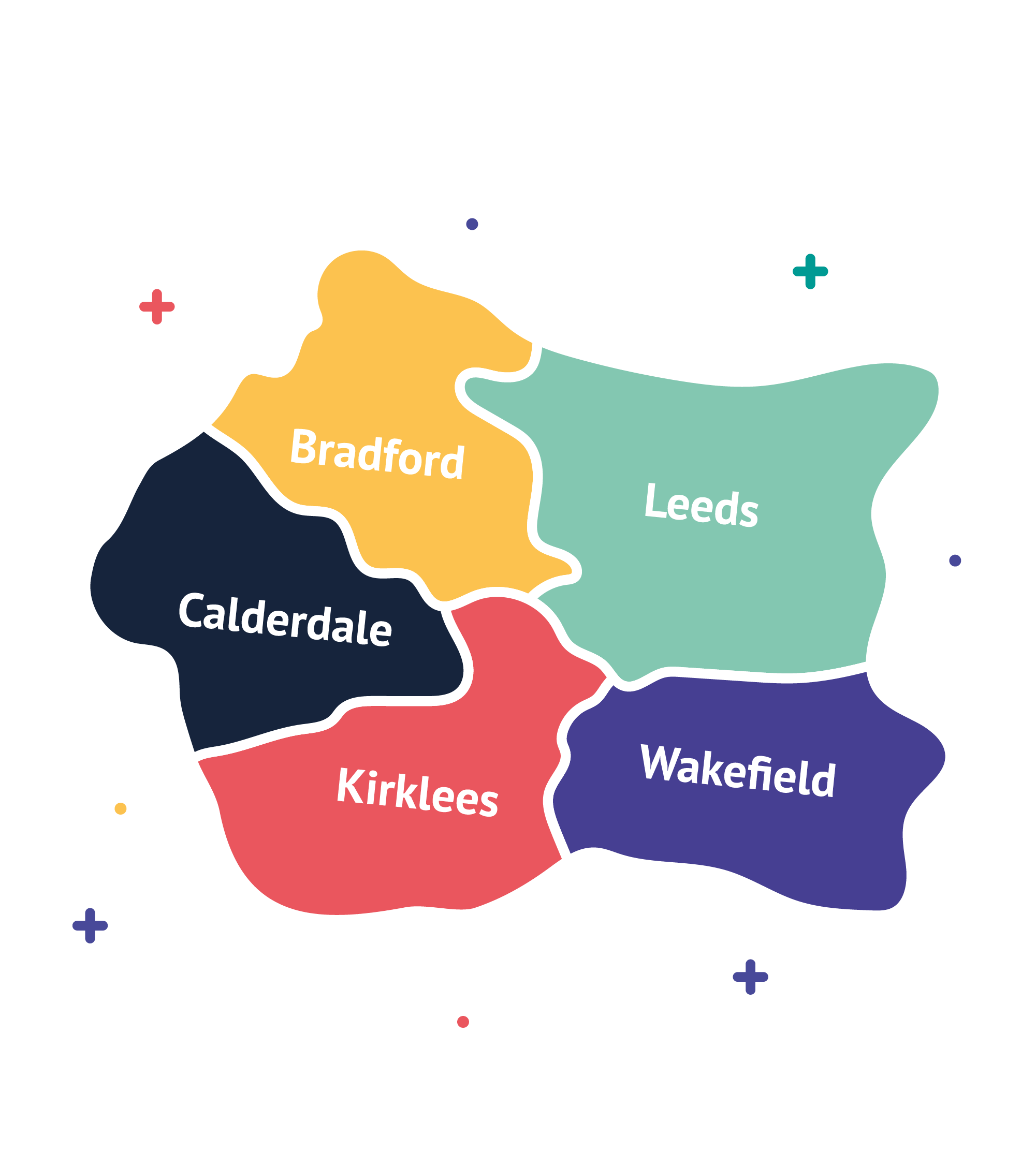
Too many people in West Yorkshire have low skill levels, are in low-paid jobs and live in disadvantaged areas. This impacts our economy through lower productivity and people’s lives through low-paying jobs without opportunities for progression.
Over a fifth of adults don’t have a GCSE or equivalent qualification
Productivity in West Yorkshire is 18% lower than the average for England
A quarter of adults in Yorkshire and the Humber lack essential digital skills for life
Two-fifths of people in work do not have essential digital skills for work
176,000 households (18% of all households) are in fuel poverty – and this is likely to rise due to the recent cost of living crisis
18% of jobs in West Yorkshire pay below Real Living Wage of £10.90 per hour
Too many people in West Yorkshire have low skill levels, are in low-paid jobs and live in disadvantaged areas. This impacts our economy through lower productivity and people’s lives through low-paying jobs without opportunities for progression.
Over a fifth of adults don’t have a GCSE or equivalent qualification
Productivity in West Yorkshire is 18% lower than the average for England
A quarter of adults in Yorkshire and the Humber lack essential digital skills for life
Two-fifths of people in work do not have essential digital skills for work
176,000 households (18% of all households) are in fuel poverty – and this is likely to rise due to the recent cost of living crisis
18% of jobs in West Yorkshire pay below Real Living Wage of £10.90 per hour
We are committed to improving skills across West Yorkshire – particularly among those who need it most
We're investing £65 million a year through our AEB to improve skills across West Yorkshire. This money is devolved, which means we have more freedom in deciding how and where it is spent. This means we can do things differently in a way that meets the specific needs of West Yorkshire. The region is now in control of more adult education funding than ever before as a result of Mayoral devolution – the biggest part of this being the Adult Education Budget.
The main purpose of AEB is to engage adults and provide them with the skills needed to find and stay in work, an apprenticeship or other further learning and to achieve the equivalent of GCSE and A Level qualifications. The funding pays specifically for engaging learning programmes (mainly qualifications) and provides an element of learner support funding for those with learning difficulties and disabilities.
We have just come to the end of our first year of devolved AEB. We can already see a real and positive impact for those it is there to help – particularly individuals from minority backgrounds, those on low wages and those from the most disadvantaged areas.

“Be yourself, be curious and be inspired.”
The following results showcase the achievements of our first full year of devolved AEB.
Priority 1
Increase the supply of skills to support key sectors in West Yorkshire
To increase the number of people with basic employability skills, and those with higher level skills and to provide skills for the key sector.

The number of providers delivering AEB in West Yorkshire was streamlined from 260 to 38 to help develop a strong partnership, but there are still over 450 different venues where learning can be accessed across West Yorkshire, on top of distance learning options.
43,000 people supported (increase of 6% on the previous year)
8,700 West Yorkshire people have attained their first-ever qualification
6,000 people achieved their first Level 2 qualification
Targeted commissioning of Bus Driver Training
Increased study in areas where we know there are skills shortages; including Digital, Construction (+900 learners, +81%), Engineering and Manufacturing (+200 learners, +18%)
43,000 people supported (increase of 6% on the previous year)
8,700 West Yorkshire people have attained their first-ever qualification
6,000 people achieved their first Level 2 qualification
Targeted commissioning of Bus Driver Training
Increased study in areas where we know there are skills shortages; including Digital, Construction (+900 learners, +81%), Engineering and Manufacturing (+200 learners, +18%)
Overall number of learners and learning aims
During the 2021/22 academic year, a total of 32,000 people were supported through the Adult Skills element of AEB and a further 13,000 through Community Learning. As many of the people supported by AEB undertook more than one course to increase their skills in different ways, this led to a total of 43,000 learners for the programme as a whole.
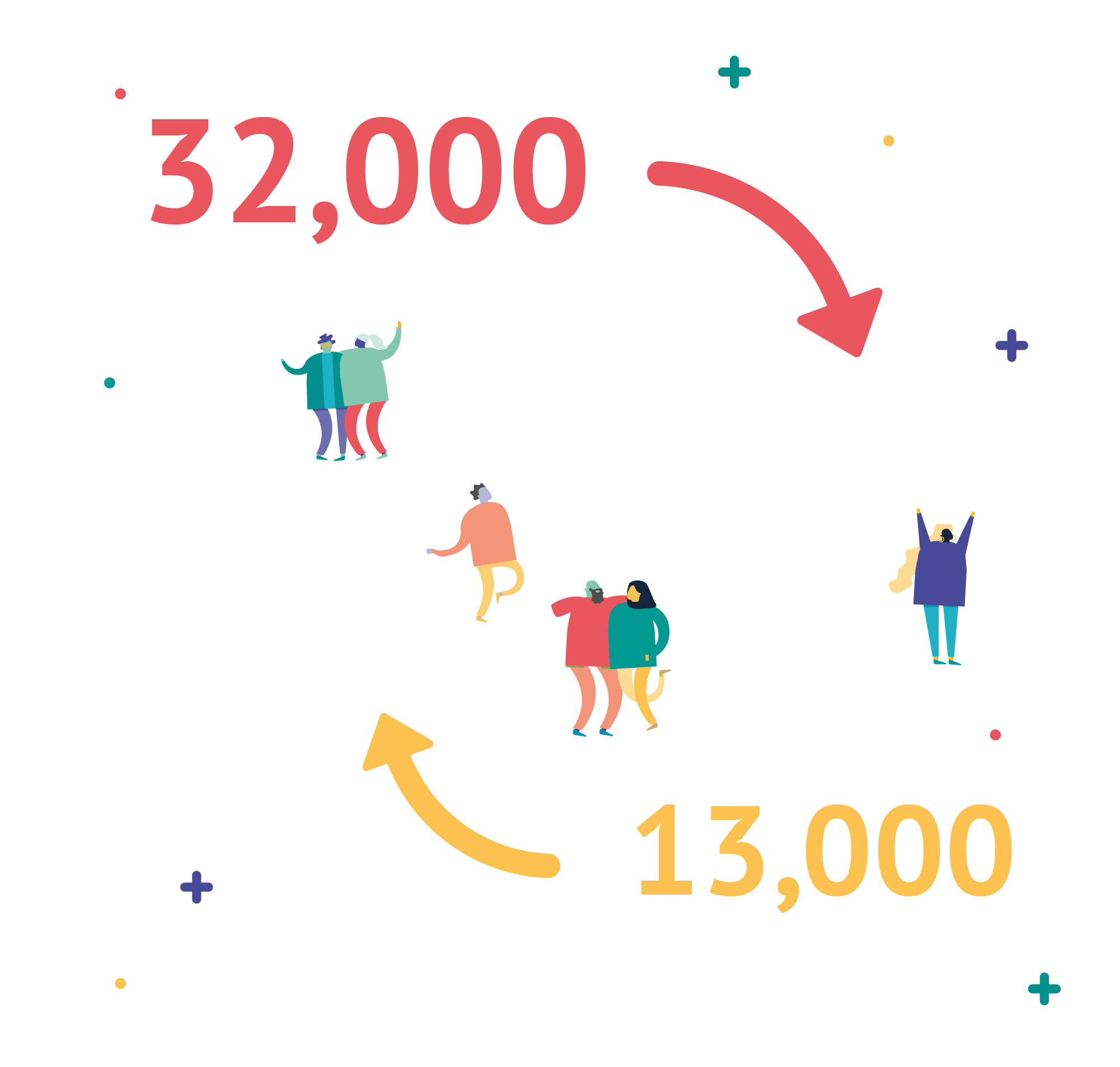
Many people supported by AEB undertook more than one engaging course to increase their skills in different ways. There were a notable 55,000 enrolments on Adult Skills courses and 22,000 on Community Learning courses: a total of 77,000 enrolments. On average, each learner enrolled for 1.8 aims.
this means they were priority learners (e.g. unemployed, have no or low qualifications, earning a low wage)
Adult Skills provision
When basic skills aims are excluded, the subject areas with the highest take-up in terms of starts during the 2021/22 academic year were:
- Health, Public Services and Care (27% of total courses started)
- Preparation for Life and Work (20% of total courses started)
- Information and Communication Technology (10% of courses started)

“As well as progressing my career, my language skills enable me to engage in everyday tasks and social activities fully and independently.”
Priority 2
Improve West Yorkshire’s resilience by developing skills for the future
A focus on skills for the climate emergency and the changing economy. To boost basic and intermediate Digital Skills in order to support inclusion and workplace progression. To increase flexible methods of delivery.
Digital was the fastest growing subject area with the number of enrolments on digital courses growing by 1,700 (78%) year on year in 2021/22, to almost 4,000
Digital entitlement expanded to include more qualifications
Bridging programmes approved to provide flexible ‘stepping stone’ before a Level 3 course.
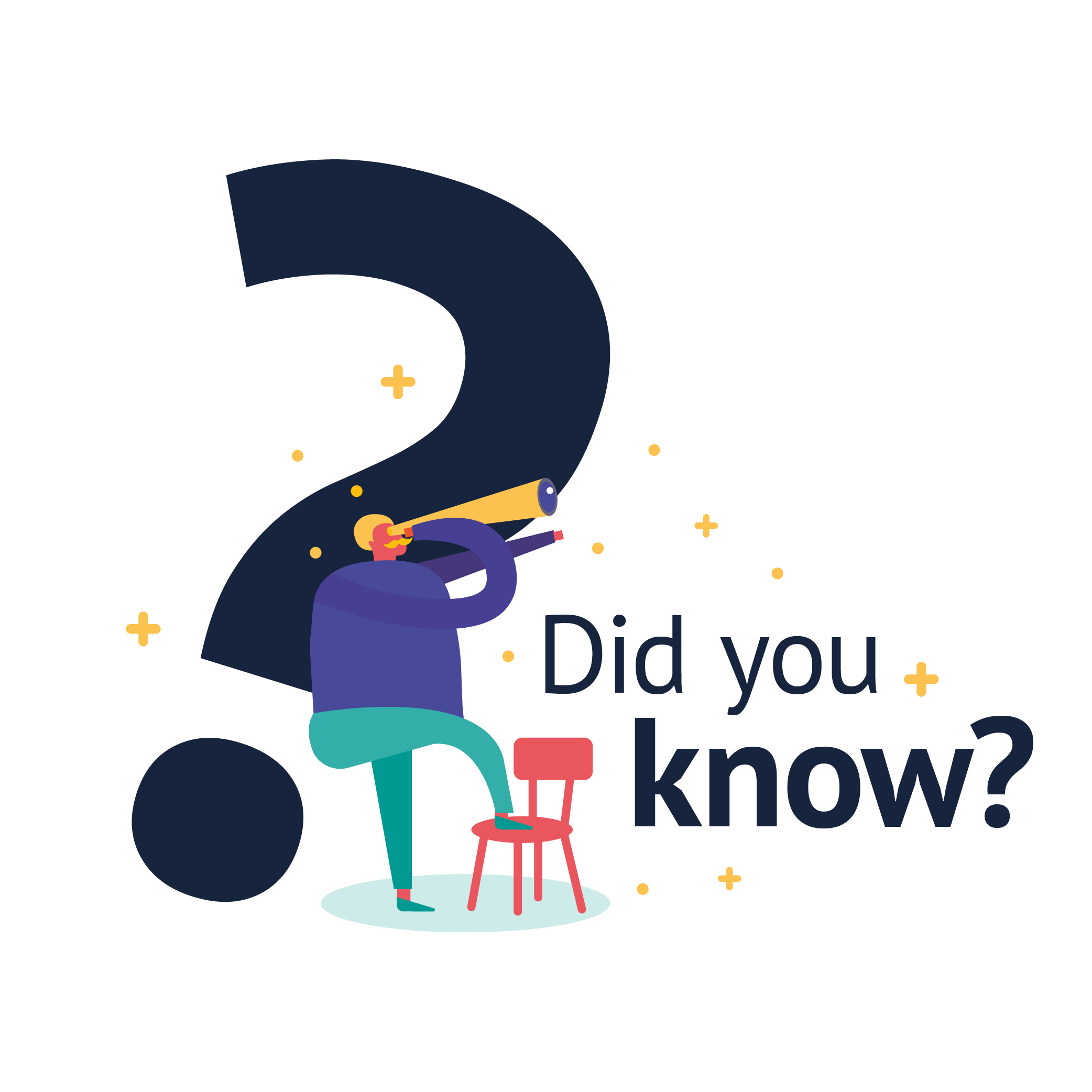
Subcontracting was reduced from £9 million to £2.25 million in 2021/22, potentially saving around £1.4 million to directly support learners rather than be taken in management fees
Essential Digital Skills qualifications, up to and including level 1, for individuals aged 19 and over, who have digital skills assessed at below Level 1
During 2021/22 there were just over 700 starts under the Essential Digital Skills entitlement. This represents a large net increase on the barely 50 starts recorded in the 2020/21 academic year, when the digital entitlement was first introduced.
Although the level of starts was highest in Bradford and Leeds, take-up of the digital entitlement was particularly strong in Kirklees as a proportion of total Adult Skills starts.
Two-thirds of starts under the Essential Digital Skills entitlement were for learners who were unemployed in 2021/22

The range of engaging courses available through the digital entitlement was expanded in West Yorkshire in June 2022. We expect to see more residents accessing this support in 2022/23.

“Since completing the Access to HE Computing course at Wakefield College, many of the skills I learnt have provided good knowledge of basic ideas such as programming and web development. Without these skills I would not have been able to progress onto the BSc in Computing Course at College.”
Priority 3
Make learning more inclusive to support disadvantaged residents
With an aim to increase participation and skills levels from disadvantaged communities and groups. With an additional focus on extending the reach of learning opportunities to a broader range of underrepresented groups and building the confidence of lower-skilled learners in order to engage and progress in learning.

4% more residents were supported from the most acutely disadvantaged neighbourhoods increased - this means in the top 10% most deprived neighbourhoods in the UK.
Equality, diversity and inclusion
One of the key objectives of West Yorkshire’s devolved AEB programme is to make learning more inclusive. This section examines the profile of learners according to their ethnicity, disability status and sex, focusing on the picture in 2021/22 and comparing it with the pre-devolution situation in 2020/21.
Ethnicity
People from ethnic minority groups are strongly represented among learners undertaking AEB-funded courses in West Yorkshire, with participation much higher than might be expected based on their representation in the wider population of the area.
The proportion of West Yorkshire learners who are from an ethnic minority is higher than the national average for both Adult Skills (national figure is 34%) and Community Learning (national figure is 27%)
This number also increased following devolution, with ethnic minority learners participating in Adult Skills increasing from 43% to 52%, whilst for Community Learning the proportion increasing from 37% to 44%.
Disability
The proportion of learners with a learning difficulty, disability or health problem increased slightly in 2021/22 compared with the previous year, from 16% to 17%. This was due to an increase of two percentage points for Community Learning from 20% to 22%; the Adult Skills proportion remained the same.
Sex
This picture is in line with the national profile. The national average proportions of female learners are 64% and 74% for 19+ Education and Training and Community Learning respectively.
Age
Adult Skills learners in West Yorkshire are relatively young, with an average age of 36 years compared to an average age for the wider West Yorkshire population (aged 19+) of 48 years

“Since completing this course, I feel more confident, and I use my skills I have developed from this course in my everyday work life as I am Additional Learning Support which I use this qualification in all subjects around the college.”
Priority 4
Support the unemployed to gain and sustain employment
By increasing the participation of people in ‘good work’ and connecting unemployment support with skills development (working with Jobcentres).
14% of learners were not in paid employment but were not looking for work and / or not available for work (i.e. economically inactive). Many of these inactive individuals will be making their first steps towards engagement with the labour market
1,602 unemployed learners were recorded as progressing directly to employment after their course
Priority 4
Support the unemployed to gain and sustain employment
By increasing the participation of people in ‘good work’ and connecting unemployment support with skills development (working with Jobcentres).
14% of learners were not in paid employment but were not looking for work and / or not available for work (i.e. economically inactive). Many of these inactive individuals will be making their first steps towards engagement with the labour market
1,602 unemployed learners were recorded as progressing directly to employment after their course

Enrolments on basic skills courses increased by 33% year on year with a 57% increase for ESOL (English for Speakers of Other Languages) enrolments

“The relaxed and friendly environment in the classroom enabled me to develop my language skills in an enjoyable yet challenging way.”
Supporting the unemployed
The Combined Authority’s AEB Strategy places a strong focus on supporting those in unemployment to gain and sustain employment through the development of valuable skills. The proportion of learners who were out of work grew from 59% of the total to 64% between 2020/21 and 2021/22.
Supporting progression in employment
A priority within the Combined Authority’s AEB strategy is to unlock progression opportunities and career adaptability through useful skills, particularly for those on low wages and with insecure work.
Around a third (35%) of learners supported through the Adult Skills strand of AEB during 2021/22 were in employment
During 2021/22 there were an impressive 6,600 enrolments under the low wage pilot in West Yorkshire, accounting for 12% of total Adult Skills enrolments, with 4,900 learners benefiting from the pilot scheme
Destinations
Looking specifically at the destinations of learners who were unemployed or inactive at the outset:
1,662 learners who were unemployed at the start of learning had a destination of paid employment (11% of total unemployed learners)
3,577 (23%) unemployed learners had a destination of part-time FE
264 (5%) inactive learners gained paid employment whilst 1,867 (35%) went on to education
In addition, 1,748 learners in paid employment at the start of learning took up more part-time study after finishing their course.
Basic Skills
Basic skills give people the levels of literacy, numeracy and digital skills needed to gain and sustain employment. AEB provides the opportunity for any adult to access courses for free to help them get up to a GCSE equivalent.
An impressive total of 13,200 West Yorkshire learners undertook a basic skills course during the 2021/22 academic year, equivalent to 41% of all learners on the Adult Skills programme
The biggest basic skills category, in terms of both learners and enrolments, was Language, which primarily consists of the English for Speakers of Other Languages (ESOL) provision. Around 7,200 learners took part in a Language course (18% of all Adult Skills learners), with a total of 10,000 enrolments (22% of the total).
The fourth basic skills category – Essential Digital Skills – had much smaller numbers of learners (around 620 or 2% of the total). This is a relatively ‘new entitlement’ and the Combined Authority has recently expanded the number of courses available in order to increase participation and skills.
Priority 5
Unlock progression opportunities and career adaptability through skills
By improving the career prospects of residents and connecting people to new and exciting job opportunities through increased skills.
6,600 enrolments funded through AEB (12% of the total) were for people on a low wage (2,000 more than in previous years)

A success rate of 86% was achieved for formal Adult Skills courses.
Supporting progression in employment
Around a third (35%) of learners supported through the Adult Skills strand of AEB during 2021/22 were in employment. Employed learners accounted for 29% of total Adult Skills enrolments. Two-thirds of enrolments for employed learners were fully funded, which means they are earning a low wage, or not having a GCSE qualification.
During 2021/22 there were 6,600 enrolments under the low wage pilot in West Yorkshire, accounting for 12% of total Adult Skills enrolments, with 4,900 learners benefiting from the pilot
An additional 2,100 enrolments for low-wage learners were supported in 2021/22 compared with the previous year, a remarkable increase of 46%.
Disadvantage
Residents of disadvantaged neighbourhoods are a priority audience for the Adult Education Budget and attract a disadvantage uplift in the funding that providers receive, recognising that it sometimes costs more to recruit and put the right support in place for these residents.
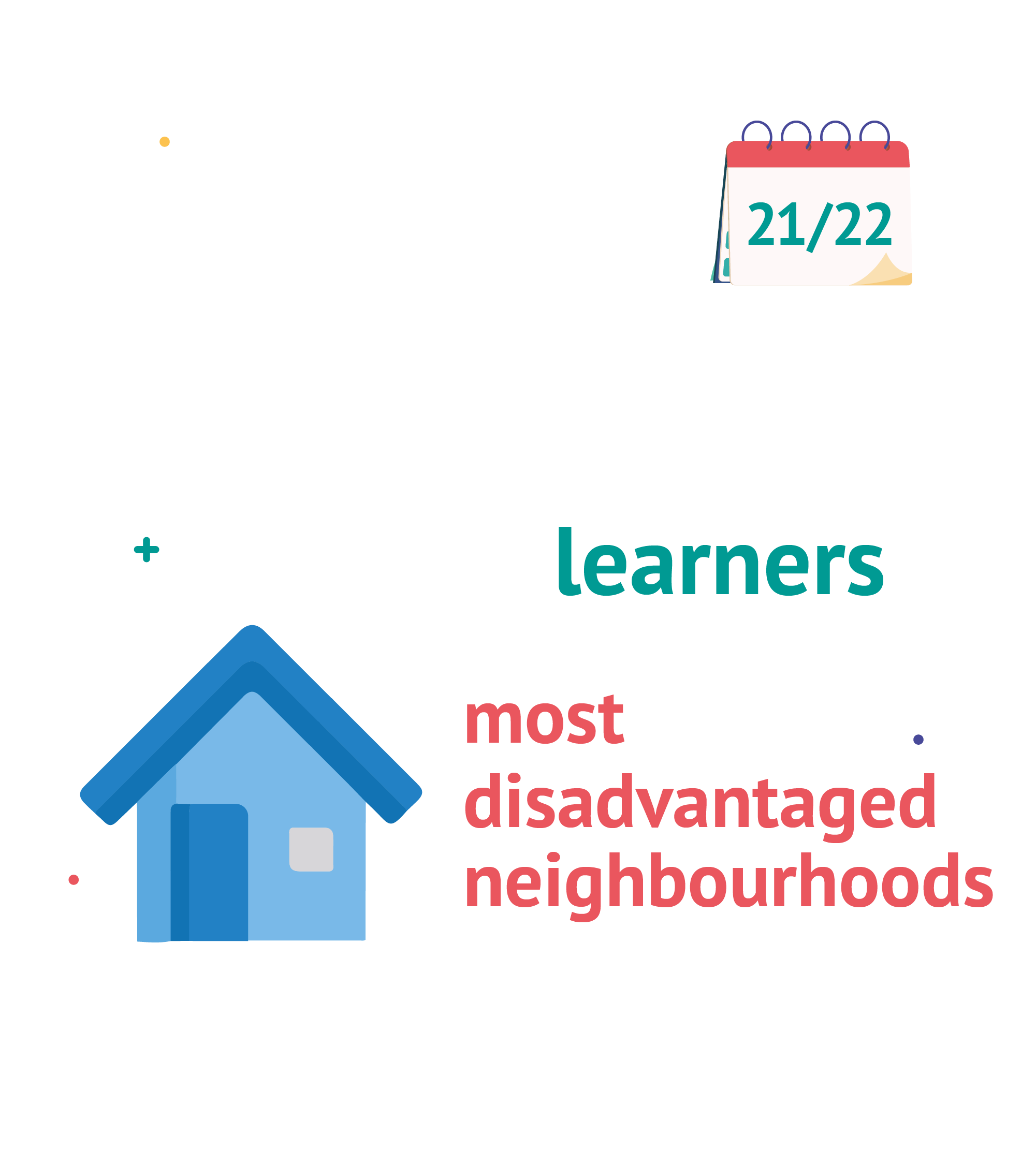
Just under 14,000 Adult Skills learners were residents of the most disadvantaged neighbourhoods, 43% of total learners in this strand and somewhat higher than the proportion for Community Learning of 36% (around 4,600 in absolute terms).
Although the devolved programme has been successful in attracting large numbers of learners from deprived neighbourhoods there are still geographic cold spots – deprived neighbourhoods with relatively low volumes of AEB provision. A key example is south east Wakefield, but the general pattern is that deprived neighbourhoods outside the main urban centres are more likely to have low levels of provision.
Level
The main focus of the Adult Skills provision is on qualifications up to and including Level 2. This is equivalent to GCSE and is typically considered the qualification level required for basic employability. .
While there was a fall in the number of enrolments at Level 1 (-16%) and Level 2 (-19%), there was a strong increase in the number of residents taking their first step in learning and coming into the labour market or building more advanced skills.

“Undertaking this course permitted me to apply for a job, and once achieved I progressed to a more substantive post. I realised that I am no longer afraid of maths, in fact as a subject I have learned to really enjoy it.”
Progression
An interesting way to measure the success of AEB is how learners are progressing.
Around 8,700 learners, or 27% of the total, undertook their first qualification through Adult Skills in 2021/22
Just over 6,000 learners achieved their first GCSE equivalent through the Adult Skills programme in 2021/22, whilst 700 learners achieved, their first A level equivalent. This supported them to gain the qualifications they weren't able to achieve at school or in full-time education.

“If I did not complete this course then I would not be able to apply for a higher position within this sector. This would make my life harder because the main point of choosing this course was so that I could work from home with a good career.”
The progression rate for some individual providers is much higher, as supporting this kind of progression is central to their strategy for learners.

“I enjoyed the course a great deal and I really appreciated my teacher too. At 62 I found I was able to not only understand maths but learn this subject and then achieve a good pass.”
Success rates
A useful way to measure the added value of the Adult Skills programme is to look at the achievement of qualifications as a result of the engaging courses provided.
View the full report here:
